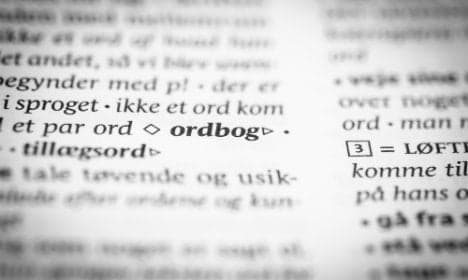'Refugee flow' named Danish Word of the Year

The Danish Language Board has announced its Word of the Year for 2015. The winner will come as little surprise to those acquainted with the country’s politics.
A board of judges representing the Danish Language Board (DSN) as well as the country's universities and media outlets has given the title of Word of the Year to the word flygtningestrømme, which translates to English as ‘refugee flow’ or ‘stream of refugees’.
The news-related noun was picked from a pool of 326 words that also included the likes of selfie-samaritaner (selfie Samaritan), kønsforræder (sexual traitor) and loan words such as ‘twerking’ and ‘JeSuis’.
The result was announced on the radio program ‘Sproglaboratoriet på P1’ (Language Lab on P1).
SEE ALSO: Ten Danish words the world should start using
“There were many words in the group that described the serious events that took place in 2015,” DSN director Sabine Kirchmeier told state broadcaster DR. “These included ‘migrant’ and ‘grænse’ (border), as well as flygtningestrømme.
“In the end we went with the latter word, because it creates an image in many of our minds of the many refugees walking along our motorway [at Denmark’s border with Germany on September 5th 2015]. And it’s not just a word that describes Denmark. It’s happening in our neighbouring countries too, so it’s something that binds us together,” Kirchmeier told DR.
Previous winners of the award have included ‘MobilePay’ (the name of a banking app), stenalderkost (Stone Age diet) and arabisk forår (Arab Spring).
Comments
See Also
A board of judges representing the Danish Language Board (DSN) as well as the country's universities and media outlets has given the title of Word of the Year to the word flygtningestrømme, which translates to English as ‘refugee flow’ or ‘stream of refugees’.
The news-related noun was picked from a pool of 326 words that also included the likes of selfie-samaritaner (selfie Samaritan), kønsforræder (sexual traitor) and loan words such as ‘twerking’ and ‘JeSuis’.
The result was announced on the radio program ‘Sproglaboratoriet på P1’ (Language Lab on P1).
SEE ALSO: Ten Danish words the world should start using
“There were many words in the group that described the serious events that took place in 2015,” DSN director Sabine Kirchmeier told state broadcaster DR. “These included ‘migrant’ and ‘grænse’ (border), as well as flygtningestrømme.
“In the end we went with the latter word, because it creates an image in many of our minds of the many refugees walking along our motorway [at Denmark’s border with Germany on September 5th 2015]. And it’s not just a word that describes Denmark. It’s happening in our neighbouring countries too, so it’s something that binds us together,” Kirchmeier told DR.
Previous winners of the award have included ‘MobilePay’ (the name of a banking app), stenalderkost (Stone Age diet) and arabisk forår (Arab Spring).
Join the conversation in our comments section below. Share your own views and experience and if you have a question or suggestion for our journalists then email us at [email protected].
Please keep comments civil, constructive and on topic – and make sure to read our terms of use before getting involved.
Please log in here to leave a comment.